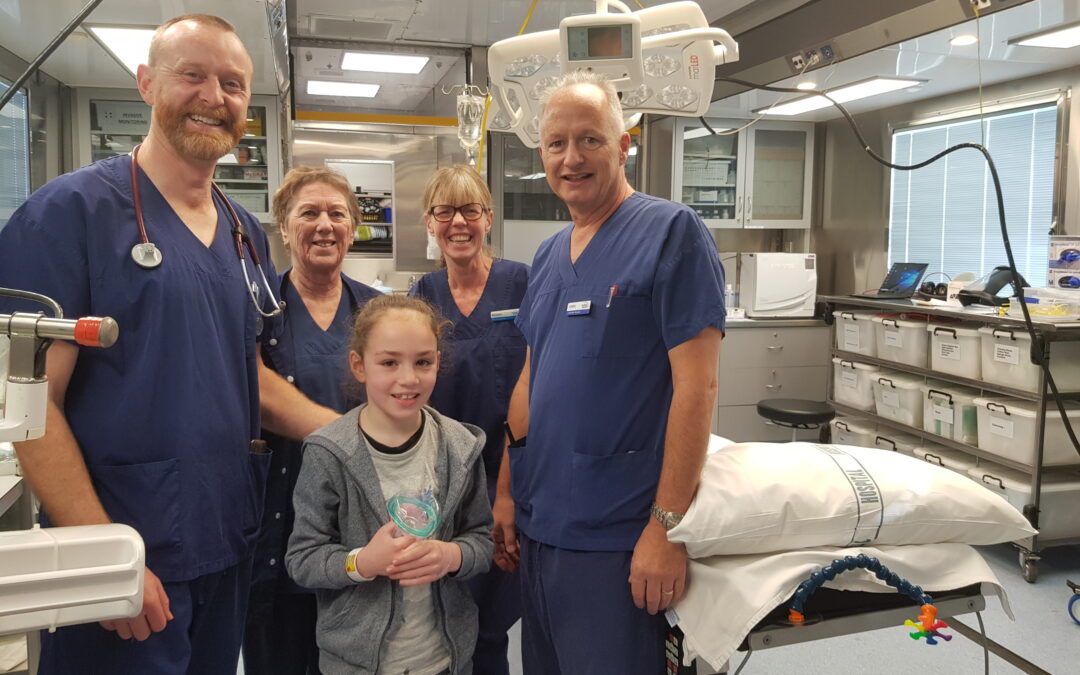(Back row left to right) Doctor Nathan Kershaw, anaesthetist; Jill Hansen, Dunstan Hospital nurse; Karenza Heath, clinical nurse leader, Mobile Health; and Chris Heath, anaesthetic technician, Mobile Health (Front row, middle) Ella Jones.
The Mobile Surgical Unit – Te Waka Hauora has been visiting Dunstan Hospital more than 150 times since 2002 and has treated 1,113 patients during that time. One of the most recent surgeries to take place was a dental procedure on eight-year-old Ella Jones back in August. Her mother, Dana, praised the surgical team and emphasised that the experience from beginning to end was easy and enjoyable; and said she received good communication through the entire patient journey. The team aboard the surgical unit at the time included Tim Mackay, surgeon, Nathan Kershaw, anaesthetist and Karenza Heath, clinical nurse leader.
“I would just like to add that the whole team who took care of my daughter Ella in the surgical unit at Dunstan Hospital in Clyde were beyond incredible.”
“Ella had such an amazing, happy, calm experience before, during and post-surgery thanks to this amazing team: Margaret, Marg and Jill were so warm, gentle and kind, from the Dunstan health side. Chris, Jason and Karenza from Mobile Health with their great sense of humour, calm, gentle and happy approach. And the amazing doctor Nathan Kershaw and the incredible doctor Tim Mackay, who did the most amazing surgery. Doctor Tim is now her favourite dentist.
“The caring, warmth, happy environment that this whole team created allowed Ella to have the most amazing healing experience on all levels.” – Dana, mother of eight-year-old Ella Jones.
Karenza has been working on the surgical unit as a clinical nurse leader for 18 years and brings a wealth of operating theatre experience covering an extensive range of surgical procedures and specialties. When posed the question ‘Why did you want to be part of this service?’ she said she wanted to continue working in the operating theatre and the mobile surgical unit job was the perfect role. “I also had an appreciation of the problems facing locals who live far away from central health services,” Karenza says. “Rural communities make up 14% of the New Zealand population and shouldn’t be forgotten or disadvantaged because of where they live. The level of service may differ from main centres, but the quality shouldn’t.”
“The surgical unit is valuable because the service helps maintain community viability and collectiveness. The local people benefit from not having to travel long distances and being treated in their own community. It also means that rural health professionals can maintain competence in a range of skills that the mobile unit helps provide and gives a sense of worth and connection among peers,” she adds.
If the patient lives in a region where the unit visits, depending on the schedule, specialty and procedure required, they may be offered the opportunity to have their procedure on the surgical unit.
“The surgical unit is a fantastic and highly valued resource serving our rural communities. Without it many of our patients would have to travel long distances to receive their procedures. The service is unique and helps us minimise the disadvantages rural communities experience in accessing health services,” Kathryn de Luc, chief executive of Central Otago Health Services, which runs Dunstan Hospital, says.
The mobile surgical unit also provides hands-on training experience for doctors and nurses and is a valuable opportunity for them to gain exposure and expertise in an operating theatre environment.
“In addition to the many benefits for patients, the surgical unit enables local rural nurses and GPs to partake in training for surgery and recovery where possible,” Carolyn Dobson, acting director of nursing and clinical services manager at Dunstan Hospital says.
“The unit has provided an important opportunity for rural clinicians to perform and undertake some practical airway management skills. These skills are invaluable for when we are caring for critically unwell patients either in our rural practices or our rural hospitals,” Mark Smith, clinical director at Dunstan Hospital, adds.
The services provided by Mobile Health has proved to be pivotal in delivering high quality healthcare to those living and working in rural communities, eliminating the need for them to travel.
The concept of the surgical unit aligns with one of the guiding principles of the New Zealand Health Strategy: Equitable access for all New Zealanders to a comprehensive range of health and disability services. Eight-year-old Ella is one of 26,308 rural patients who have received high-quality treatment on the surgical unit.

